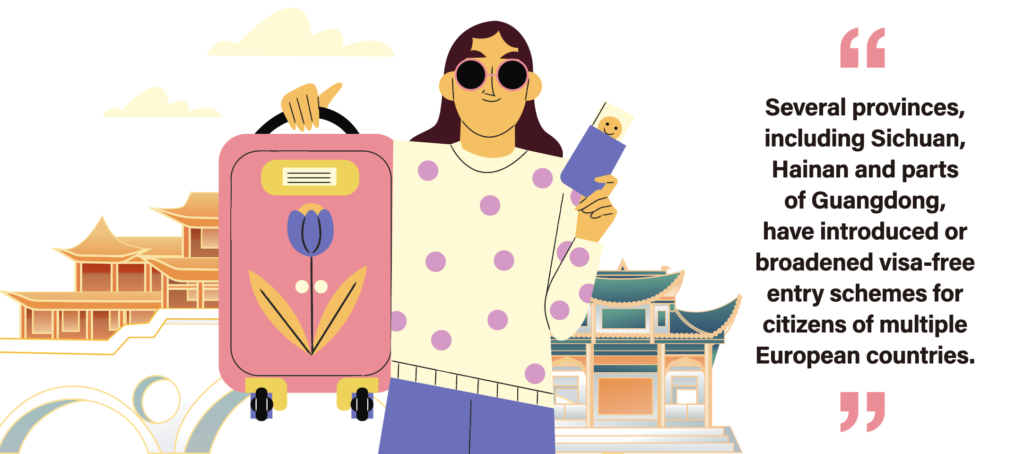
European companies can benefit from a resurgent tourism industry
China’s travel industry is currently experiencing a resurgence following the COVID-19 years. With evolving travel preferences and expanded visa-free policies, the summer economy promises significant opportunities – especially for European companies operating in or doing business with China. Ken Zhang of Le Tour explores key travel trends benefiting the sector and the impact of new visa facilitation measures.
Post-pandemic travel trends: Which sectors are thriving?
The COVID-19 pandemic dramatically altered travel behaviour worldwide, but 2025 marks a turning point as Chinese travellers eagerly return to exploring domestic and international destinations. Several segments stand out:
1. Experiential and premium travel
Tourists are increasingly shifting from traditional sightseeing towards more meaningful, immersive experiences. According to China Travel Online, Chinese outbound travellers in 2025 are prioritising cultural and lifestyle enrichment when choosing destinations.[1] This aligns with the surge in demand for wellness retreats, cultural heritage tours and curated gastronomic journeys.
Premium travel spending reflects this trend: 28 per cent of outbound tourists now budget over Chinese yuan 50,000 for their spending.[2] European operators—known for their craftsmanship in experience-based tourism—stand to benefit by co-developing high-value itineraries with Chinese partners.
For example, a Chengdu-based luxury travel operator partnered with a German travel company to launch a boutique multi-city route covering Chengdu, Jiuzhaigou and Daocheng Yading. The product blended five-star stays with authentic Tibetan cultural experiences, attracting over 1,200 bookings from European tourists.
2. Family and multi-generational travel
Post-pandemic, many families are prioritising spending quality time together. Summer camps with educational and cultural elements, multi-generational group tours and interactive museum visits are popular. European cultural and educational institutions can expand their presence in China by offering localised summer programmes, language camps and joint heritage projects with Chinese partners.
3. Domestic tourism boom with regional diversification
While top-tier cities remain travel hubs, there is strong growth in less-explored regions like Sichuan, Yunnan and Inner Mongolia. Domestic travellers seek nature, outdoor activities and exposure to different cultures, which opens partnership avenues for European lifestyle, wellness and outdoor brands to enter these niche markets. For example, one Kunming-based outdoor equipment company partnered with a French outdoor brand to create ‘green adventure’ hiking experiences that emphasised sustainability and local environmental stewardship. The initiative targeted younger eco-conscious travellers and tapped into the growing demand for responsible tourism.
4. MICE and business travel rebound
The Meetings, Incentives, Conferences, and Exhibitions (MICE) sector is back after suffering a serious downturn during COVID-19. With the modern business traveller demanding seamless, integrated travel solutions, European airlines, hotels and event organisers can collaborate with Chinese counterparts to offer streamlined visa support, multi-city travel packages and culturally immersive conference programmes.
One Chengdu venue even partnered with a European airline to offer comprehensive summer MICE packages that included flights, hotels and venue services, alongside streamlined visa assistance and local cultural immersion options.
Tourist spending
Summer travellers are spending more on premium accommodation, authentic dining experiences, wellness activities, and personalised services such as guided tours and private transfers. Affluent consumers increasingly choose four- or five-star hotels or boutique stays,[3] while interest in culinary-led travel has surged.
The wellness sector is also booming, with global wellness tourism worth a massive United States dollar 830 billion in 2023.[4] While popular experiences include spa visits and yoga retreats, demand for customised travel services has risen in recent years, as travellers increasingly seek deeper, localised experiences.
Meanwhile, digital engagement continues to grow, with virtual tours and contactless payments now baseline expectations – particularly among Gen Z and Millennial travellers.
Visa-free policies: A catalyst for tourism growth
China’s recent expansions of visa-free travel and new, simplified visa policies have become a significant catalyst for the summer tourism revival.
Expanded visa-free access

Several provinces, including Sichuan, Hainan and parts of Guangdong, have introduced or broadened visa-free entry schemes for citizens of multiple European countries.[5] These policies lower barriers for short-term visits, encourage multi-city travel and make last-minute trips more feasible.
Streamlining group and individual visas
Simplified visa processes, longer validity periods and easier multi-entry permissions enhance traveller convenience, especially for business and leisure visitors combining trips across China’s diverse regions.
Impact on European companies
European travel agencies, airlines and hospitality groups benefit from these policies by marketing easier-access destinations to their clients and developing integrated packages. For example, airlines can promote flexible multi-city ticketing (e.g., fly into Chengdu, depart from Shanghai), while tour operators can highlight visa-free zones to attract independent travellers wary of bureaucratic hurdles.
Boosting inbound and domestic circulation
The visa-free schemes not only facilitate inbound tourism from Europe but also stimulate domestic tourism by enabling seamless regional transit, encouraging visitors to explore beyond first-tier cities.
How European companies can profit from the summer travel season
European companies are well positioned to capitalise on China’s booming summer travel season by leveraging their expertise, brand reputation and unique cultural assets. Practical approaches include:
Co-developing tailored luxury and experiential products
Partner with Chinese destination management companies to design high-end, culturally immersive itineraries that appeal to affluent Chinese travellers, commanding premium pricing.
Expanding educational and cultural exchange programmes
Develop summer camps, workshops, and joint exhibitions that attract family and student groups for educational enrichment during school holidays.
Leveraging digital marketing and e-commerce channels
Utilise China’s advanced digital ecosystem of apps such as WeChat, Douyin and Xiaohongshu to market products, leveraging local influencers to build trust and drive bookings.
Entering niche markets through local partnerships
Collaborate with regional operators in less-explored provinces to tap into nature, sustainability and authentic culture-focussed segments, establishing grassroots brand loyalty.
Providing seamless integrated services for MICE and business travel
Bundle flights, accommodation, event access, and visa facilitation for business travellers to improve satisfaction and drive repeat business.
Customising payment and booking systems
Adapt payment methods to include Alipay and WeChat Pay, and integrate with local travel platforms to remove friction and increase conversions during peak season.
Market access barriers
Despite the promising opportunities, some challenges prevent European companies from fully participating in the market:
Regulatory complexity and licensing restrictions: Foreign travel agencies often need to be part of joint ventures and require complex licences. Simplifying licensing or creating special permits would encourage investment and innovation.
Uneven enforcement of visa facilitation policies: Inconsistent application across regions causes uncertainty. Clear nationwide guidelines and communication channels would improve traveller confidence.
Limited access to domestic distribution channels: Chinese online travel agencies sometimes prioritise local partners. Opening platforms or creating international seller windows would enhance fair competition.
Cultural and language barriers: Navigating regulations and consumer preferences is challenging. Supporting capacity-building initiatives, training and incubators would help European firms to localise their operations.
Data privacy and compliance challenges: Complex cybersecurity laws require investments in compliance. Clear guidance and trusted local partnerships can ease this burden.
Recommended government actions
- Streamline and harmonise licensing for foreign operators with transparent, expedited pathways.
- Facilitate platform access and cross-border e-commerce through government-supported matchmaking.
- Promote multilingual information, translation services and cultural orientation workshops.
Seizing opportunities in China’s summer economy
Going forward, China’s summer economy is likely to offer strong potential for growth fuelled by rising travel demand and supportive policies. European companies that leverage local expertise while taking advantage of the new visa-free travel policies can create unique products, build lasting partnerships and capture this expanding market. Meanwhile, reducing regulatory barriers and improving market access through government initiatives will unlock greater potential for mutually beneficial tourism cooperation.
Ken Zhang is the operations manager at Sichuan Le Tour International Travel Service. With a degree in business English, he brings over 18 years of experience in inbound tourism, group travel and MICE services across Southwest China.
Sichuan Le Tour International Travel Service is a boutique destination management company specialising in luxury foreign independent travel, immersive cultural experiences and premium MICE programs. Operating throughout Sichuan, Chongqing, Yunnan, Tibet, and Guizhou, the company provides seamless logistics and authentic local access for discerning travellers.
[1] China Outbound Travel Trend Report 2025, China Outbound Travel Resources and News, 30th May 2025, viewed 27th August 2025, <https://www.chujingyou.org/china-outbound-travel-trend-report-2025/>
[2] China Trading Desk Q1 2025 survey reveals 58% of Chinese travellers intend to shop at airport, DFNI Online, 15th April 2025, viewed 27th August 2025, <https://www.dfnionline.com/latest-news/china-trading-desk-q1-2025-survey-reveals-58-of-chinese-travellers-intend-to-shop-at-airport-15-04-2025/>
[3] Brooker, A, Boutique hotels win big in China’s travel surge, Jing Daily, 19th September 2024, viewed 29th August 2025, <https://jingdaily.com/posts/boutique-hotels-win-big-in-china-s-travel-boom>
[4] The Global Wellness Economy Reaches a New Peak of $6.3 Trillion––And Is Forecast to Hit $9 Trillion by 2028, Global Wellness Institute, 5th November 2024, viewed 28th August 2025, <https://globalwellnessinstitute.org/press-room/press-releases/the-global-wellness-economy-reaches-a-new-peak-of-6-3-trillion-and-is-forecast-to-hit-9-trillion-by-2028/>
[5] Regional Visa-Free Entry Policies for Foreign Nationals, National Immigration Administration, 14th February 2025, <https://en.nia.gov.cn/n147418/n147463/c180637/content.html>


Recent Comments